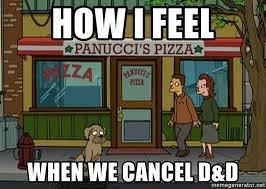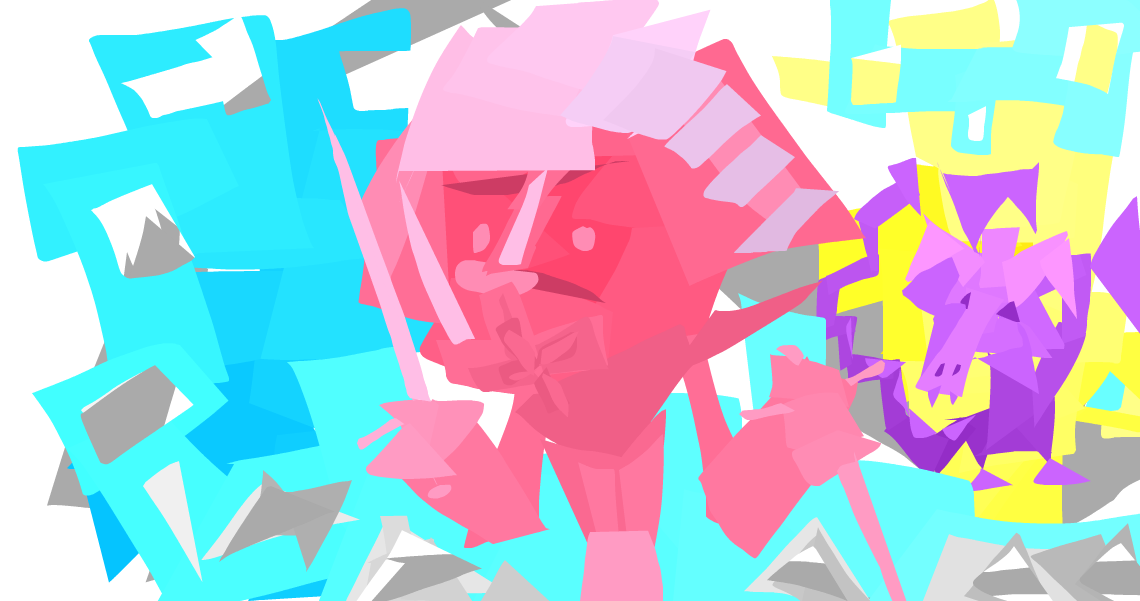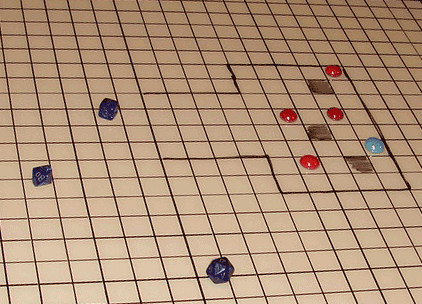What To Do When Players Cancel
It's the situation everyone fears, you've spent all week looking forward and getting ready for D&D and someone cancels. Your carefully planned and balanced session was designed for 5 players and now you've got 4 (or less), and maybe even the person missing was important to the next part of the story. You don't want them to miss out on the cool plot points you've planned out, so do you cancel? No. Never cancel. Even if just 1 other person shows up, you can run a fun game and have a good time.

What kills campaigns is habitual canceling, the longer you go without a session the less everyone is willing to commit to one, which exacerbates the problem and creates more no-shows until the group falls apart. A consistent and regularly scheduled campaign creates a sense of safety and routine. We're creatures of habit, so the more habitual your games the less people will cancel. Being unsure if the game will actually happen makes people think they should have other plans as a backup, but if your group meets regularly then your players will be more likely to plan around it. That's why game stores schedule regular weekly events, it gets more people to show up if they know they can count on it being there.
So what do you do? You can run the session as planned if you want, just modifying some of your encounters for the new party size. You can also run a one-shot, there's a bunch you can use on the site, or you can make up your own one. Even if it's the DM that can't show up, this can be a good opportunity for someone else to give it a try.
“Whoa now, it took me all week to design this session, how am I supposed to come up with one in just a few hours?” It's okay (and expected) to take shortcuts on an impromptu session. Throwing together a quick one-shot is no different than reacting to some unexpected or crazy action by your players during a game. Try going heavier on the RP, it requires the least amount of prep. Time spent by your players talking to each other and NPCs is time you don't have to prep much for. You can just generate NPCs to chit-chat with them, sometimes the players will be content to sit and talk to each other in the tavern.

When running a one-shot that's unrelated to whatever you were doing last session, you can treat it as an alternative timeline sort of thing. Maybe they all remember an old adventure they went on in the past, or maybe it's with all-new characters (this can be a great opportunity to try out one of those other thousand character ideas). Getting together to play D&D regularly with your friends is what's important. This might also be a good opportunity to explore some character backstories, as both a way to reward those that showed up and explore some storylines that might not need everyone present.
In some cases, simply having the character of the person that's missing either fall unconscious or mysteriously disappear can be a fun adventure in itself. What happened? How do we help them? Did someone do this? Maybe they get a mysterious illness, or get kidnapped, or their soul is imprisoned somewhere. This creates a nicely self-contained adventure with a convenient resolution when they return (or dramatic plot point if they never do).
Life changes, things happen, and D&D is a game. Like I said in my “How To Overcome DM Anxiety” article, D&D is a great game to play but you're not always going to want or be able to play a game. For some people, just knowing that your friends are at the table every week or every month and ready to play can mean a lot and be a bit of lawful stability in a chaotic schedule. With just 1 other person you can play, and have a lot of fun while keeping the group going. One-shots and even smaller subplots are a great way to explore some details and different angles of your campaign that you hadn't considered before.

If you have some encounters you really worked on or wanted to try out, you still can with a smaller player pool. Removing some creatures from it will bring the difficulty down, since a lot of the difficulty of an encounter is based on which side has the numbers advantage. There's also plenty of opportunity for random encounters at any point. There are no classes in D&D that are considered “necessary” to have in a group, so a party of any size or makeup can succeed in combat. If things get really ugly and you badly unbalanced the encounter, remember that not everyone that fights the PCs wants to kill them. This is a side-story, you're entitled to some leeway both mechanically and narratively. Some of the more memorable side-stories on TV shows end with some sort of joke or overblown goof-up.
Often your resolution can be just getting back to where you were supposed to be at the start of the session, or a return to normalcy. Don't be afraid to end on a cliffhanger if it depends on whether or not the person will be back next week. “You open the cell door where you think your friend is being held, and then... we'll find out next time.” This can have the side-benefit of enticing that player to return if they hear about how the session was all about finding them. They may want to find out what happened too. Being adaptable with DMing for different numbers of players is just as important as being able to react to unexpected player actions. In a game where a roll of the dice can change outcomes so dramatically, a low player count is just the same as another low roll. It's how you use that outcome that matters.
Want even more help with your D&D session? Check out all the other tools, generators, and articles: https://www.kassoon.com/dnd/
Shout outs: Stacey, Micah Isaiah, Stefku, rtlowe80, Brian Nunziato, Garrett Smith, Marinos Papadimitriu, Carlo Puche, PartySheep, Matt Yates, Elisa Martinez, Ryan Flagg, JMartins, Jade Arrowood, Sean Kane, Angelo Anderson, yoland katamari, Dave Walker, Rhonda Seiter, Alexa Hobusch, Jonathan Lekse, Katie White, JollyGamer, Jayden wingler, Yi Tan, Burlyfighter, Gillian Tolbert, David R Abbott, Rick Marsh, Brittany DeNicholas, Phillip Hash, Amanda Kettles, John Trent Dumproff, Lou Bliss, Pythor Sen, Michael Isberg, Nat, Cory Evans, Thomas Wilhelm, Krueger82, BestWorseCaseScenario, Damian Steele, Irate The Pirate, Icarus Unleashed, Mark L, Conall Reilly, keith oneal rogers, Patrick Natale, Cam Largent, Thaddeus Johnson, Siren, Donavan Guay, AstroLass, Lizzie, Michael Hamilton, Vedie V, Mylon Schroder, Nathan, Tiffany Mathis, Jordan Florez, Robert Rich, Rodney O'Dell, Robin Ellis-Foster, Deanna Pyle, Jess, Lars Yell, Zee Livezey, Kevin, Kerry Melton, Mary Kieser, SallySparrow132, Naomi B, J, Millergendraft, Federica Frezza, Nick Soucy, Melanie Warga, Jeremiah Walker, Bryan Sheairs, Bryan Kempka, chris wilson, Max Hops, Sarah Holland, Joshua David Maddox, Jennifer Smith, Liz Fontain, Ray Bissonnette, Joe Dalby, Joline Tran, Nicholas Zamora, ShortyMcgibble, Mr. Vinclair, mtnman1979@aol.com, KFB_Patreon, eric sun, Dani, Bruce Willison, Gundar Wez, Nahellion, Ben Pytlik, Nicholas Hanke, bilbens baggo, Stuart, Brysen Packer, Maxwell Mayer, Gannon Dubay, Caio Mantovani Alves, Thobek, Aaron Teupe, Felix Schmäche, XMrMonkyx ., Miss Zilla M, Jordan Brazeal, Kyle Clark, Jake Lane, Adam Ruiz, Phillip P Torchia, Stefan Gottschalk's, Remora Jewel, jeremy baisch, Daniel Edwards, Zealot23, Shane Andrews, Brandon Mußiq, CJMAXP, KingHavok1217, Mx Charlie, Zachary Burgess-Hicks, Shazear, Steve Rosenlund, Leanna Orr, lufink, Ezzela1891, John Nazario, Gary, Gordon Alexander Fallon, Justin Stensgard, Jason Clark, Trey Vickory
Their contribution stands as a beacon of hope for all adventurers!


